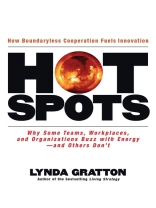You always know when you are in a Hot Spot. You feel energized and vibrantly alive. Your brain is buzzing with ideas, and the people around you share your joy and excitement. Things you’ve always known become clearer, adding value becomes more possible. Ideas and insights from others miraculously combine with your own to create new thinking and innovation. When Hot Spots arise in and between companies, they provide energy for exploiting and applying knowledge that is already known and genuinely exploring what was previously unknown. Hot Spots are marvelous creators of value for organizations and wonderful, life-enhancing phenomena for each of us.
Lynda Gratton has spent more than ten years investigating Hot Spots–discovering how they emerge and how organizations can create environments where they will proliferate and thrive. She has studied dozens of companies and talked to hundreds of employees, managers, and executives in the US, Europe, and Asia. She has asked the important questions: Why and when do Hot Spots emerge? What is it about certain groups of people that support the emergence of Hot Spots? What role do leaders play? She’s discovered a host of elements that together contribute to the emergence of Hot Spots–creating energy and excitement, and supporting and channeling that energy into productive outcomes.
In this groundbreaking book, Gratton describes four crucial qualities that an organizational culture must have to support the emergence of Hot Spots, looks at what leaders can do to encourage them, and offers activities and tools you can use in your own company to increase the probability of them arising. In these days when traditional organizational boundaries are becoming barriers to progress, Gratton offers advice and guidance that you can use right now to increase the probability of Hot Spots emerging in your organization.
关于作者
Lynda Gratton is Professor of Management Practice at London Business School where she directs the school’s executive program, ‘Human Resource Strategy in Transforming Organizations.’ She is the author of The Democratic Enterprise, Living Strategy, and Strategic Human Resource Management. She has twice been named one of the world’s top management thinkers in The Times of London.












